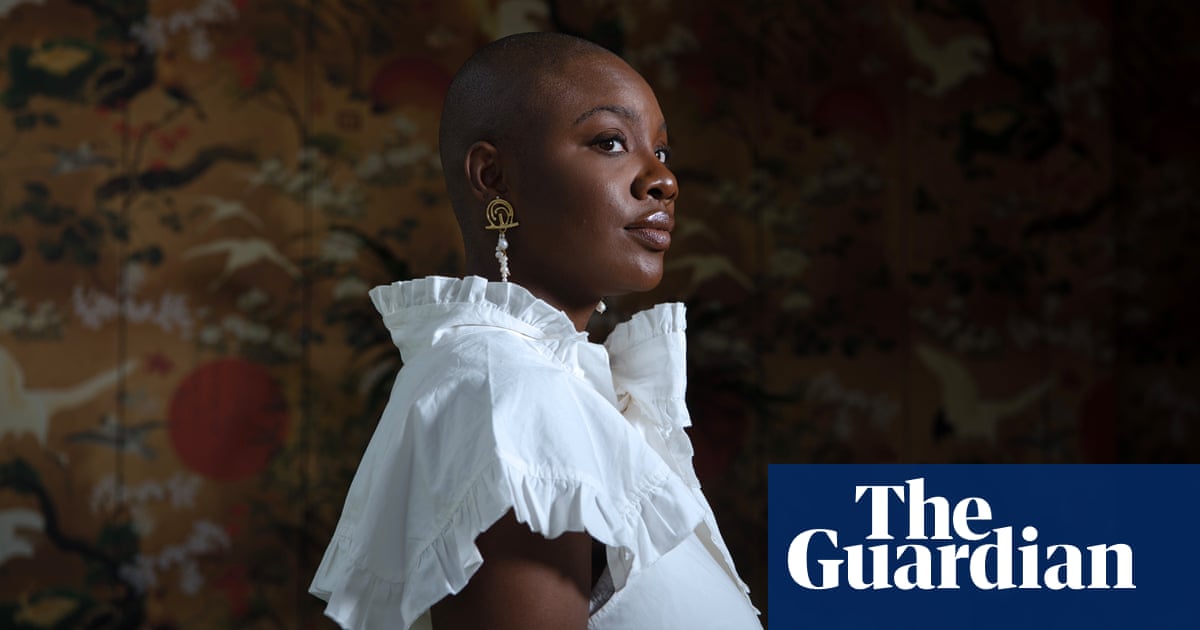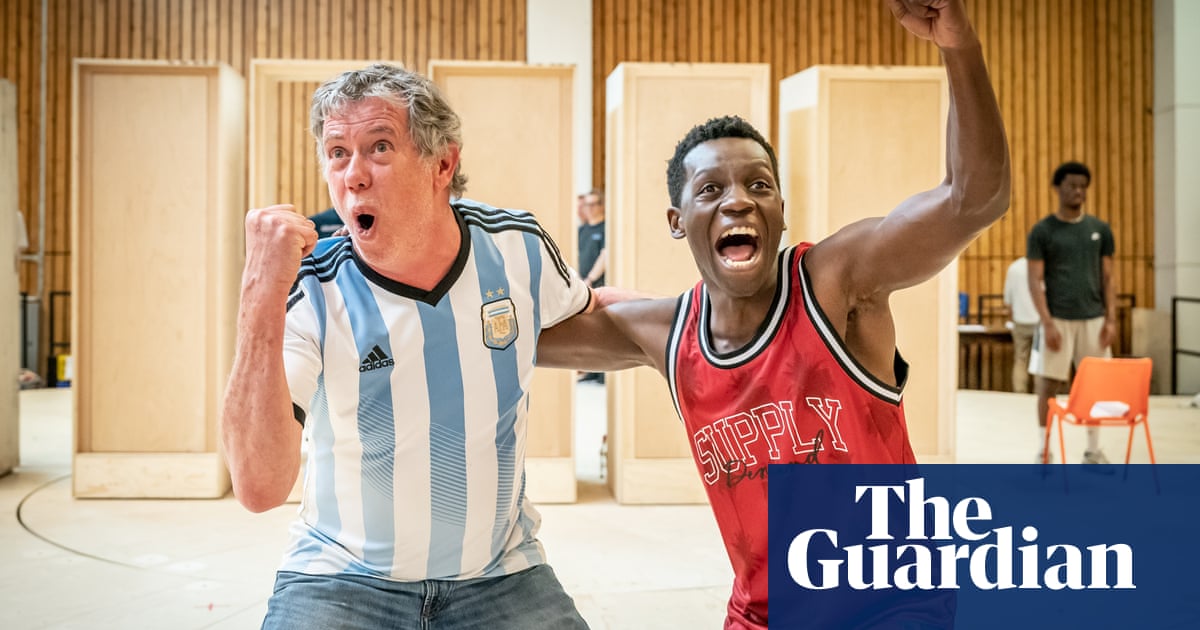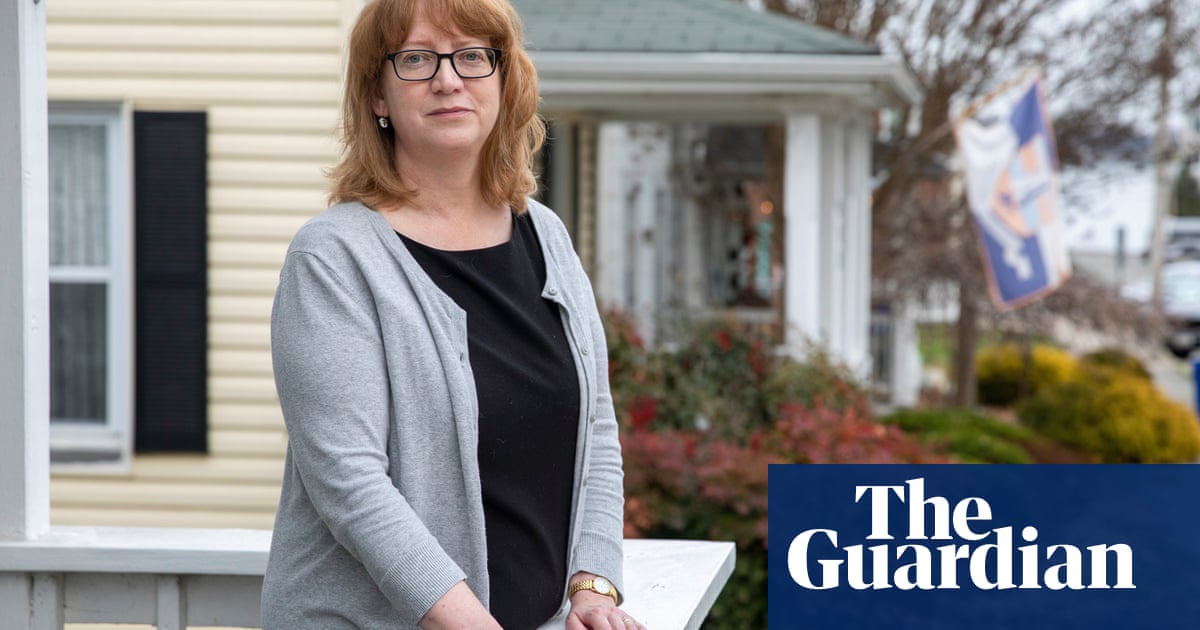
“Honestly, I’m a better painter than I am a writer,” says Yomi Adegoke, cackling, as she takes a sip of prosecco. “Genuinely, that’s my skill. That’s my actual ability.”
Adegoke is supposed to be telling me about the period of lockdown in which she began writing her debut novel, The List. But instead she navigates the time warp of the pandemic by remembering the volume of made-for-TV movies she piled through with her mum and sister, the three of them crammed together in her sister’s flat, and then through the many self-portraits she painted, rendered in acrylic and oil.
“I was doing the most navel-gazing – I was on my Van Gogh shit. I painted so many self-portraits, because all I could really see was me?” I laugh, but she means it. Her paintings, she says, reveal her most natural talent.
It’s probably not how Adegoke’s publisher would like their bright young star to be promoting her literary career. After all, The List, due later this month, is arriving with much fanfare and is one of the most anticipated books of the summer. But Adegoke, 31, is refreshingly self-assured, unafflicted by the self-doubt and low self-esteem that has become a millennial tic.
“I used to say I’m a journalist, and identify that way, even though I came up through Twitter and didn’t get the qualification. But now I always say I’m a writer,” she asserts. “It encompasses everything: TV, fiction, nonfiction. I host and do other stuff, but writing is the main thing I do right now.”
We meet in the bar of a plush Wes Andersonified hotel, set in 200 acres of green fields in deepest Croydon, where Adegoke is a founding member of its club. Dressed in a white prairie dress and wearing architectural earrings, she is glamorously post-photoshoot and pre-party. There’s an event for Central Saint Martins fashion graduates that she’ll be popping into later. The night before, I bumped into her at a book launch for a friend before she headed off to a party hosted by Mulberry.
“That was wild. Mulberry couriered this new bag [to the pub] for me to wear to the event and Harriet [Gibsone, our mutual author friend] thought I’d left it for her.” She mock-groans. “I’ve only met her twice and now she must think I’m in love with her because I’ve sent her a Mulberry bag.”
In fairness, the bag has since been retrieved. Adegoke laughs again, delivering a comic retelling of the mutual embarrassment of having to un-gift a £1,000-plus bag from a debut author she’s been keen to champion.
Sitting across from me at a small round table, glass in one hand and phone in the other, she is a force of personality – charming, chatty, a whirlwind of laughter and hustle – so I don’t mind when it becomes clear that we’re only going to get through about five of my questions in the time she has. Or when she’s straining so hard not to answer directly that she runs us both around a loop of half-thoughts and non sequiturs until I agree that, yes, yes I do know what she means.
Three years ago, Adegoke says, her work was precarious; she was – and is – a freelance writer and micro influencer, and had regular columns in the Guardian and Vogue. But back then, during the pandemic, she had just split up from her boyfriend and, with so much time on her hands, felt pressure to create something but didn’t actually have a book to write. “I was thinking: ‘Shit, what am I going to do?’ I was really miserable, heartbroken, worried about being broke and wanting to buy a house – and that’s where it started.”
She dusted down an idea that had been knocking around since 2018, after the first wave of #MeToo revelations had spun the world from its axis. Namely, what would the fallout look like for a couple – young, black, Insta-famous – who suddenly find their relationship upended when he, Michael, is named on a viral list of sexual abusers and predators, and she, Ola, is a feminist journalist whose bread and butter is taking down sexual abusers and predators?
Ripped from the headlines but unpacked at a human level that examines the real-life repercussions of a situation blowing up online, The List takes a twisty journey through the nuances Adegoke feels have been underplayed in the black and white understanding of #MeToo.
“I would say I wrote it for the people who are looking for the grey areas within a very complicated and sensitive conversation. I guess when I’m writing, I am really honestly trying to change minds or speak to people I wouldn’t normally.”
Much of the inspiration has come from her own conversations around social media and sexual abuse in recent years, around the power of the internet and the divisions that have become entrenched, online and off, when it comes to racial, sexual and cultural politics.
“There was a time when every industry had its own list [of alleged sexual abusers and predators] circulating, right? Music, film, media. I’ve seen names on lists where I’ve gone: ‘Gosh, I’ve heard about this before.’ And then there are others where your kneejerk is: ‘Oh. OH.’ I remember seeing one particular allegation and then later some information coming out that really complicated things.”
As with her character Louis? Adegoke writes him as an ageing footballer accused of rampant homophobia who turns out to be secretly gay. “Louis was a really interesting one for me, because that is quite literally an example I’ve seen play out on more than one list where it’s complicated by sexuality 100%.”
Reading through her columns, watching her successfully debate at the Oxford Union (arguing against the rise of hookup culture) and absorbing her many podcast appearances, it’s obvious Adegoke’s perspective is sorely needed in the culture. Nonetheless, today she claims that she’s actually a perennial “fence sitter” devoid of spicy opinion. A persistent fear of being turned into a meme or cancelled has, she says, made her shrink away from social media while admitting she needs it to “curate” her online self.
“I’ve become heavily conscious of what I put out online. It’s so easy for things to go wrong, and I do think we will look back at this period and say: ‘That was insane. That was the wild west.’” Given how vivid and lengthy the sections on social media abuse are in The List, I wonder if she feels especially bruised by her own experiences online.
“I wouldn’t say bruised. It’s like putting your hand in a fire. You learn from it. I’ve healed.” We circle around times when an article of hers has gone viral for the wrong reason or there’s been a racist pile-on in the comments section, but she glosses over how much she lets it bother her.
“I’ve got thicker skin now. I just think in the future we’ll look back at things like memes, where you’re using someone else’s image without consent and turning them into something that’s not … ” She pauses. “I just think we’re all gonna learn lessons, because the way we use social media now is not sustainable.”
For all her wariness around her public image, things are going extraordinarily well for Adegoke. A year before she had finished writing her book, the TV rights were bought by the powerhouse combination of HBO Max, BBC and A24. You couldn’t dream up a more prestigious production force. The making of the show is now under way with Adegoke on board as creator and executive producer.
“I’d written the first nine chapters [of the book] before I had my first meeting with HBO,” she explains, talking me through the secretive process she underwent for months before she was allowed to tell anyone. “I thought the storyline really had TV potential, so I talked to Hayley [her agent] about it.”
Once she’d arrived at her central idea, Adegoke went through several iterations with The List. At one point she thought it might be a play. “I found the writing process horrific. I really hated it – I was overthinking it, thinking that it had to be really literary. I was conscious of having a serious journalistic background. And the first draft was horrendous. It was so boring.”
It was after a conversation with Kiley Reid, author of the Booker-longlisted Such a Fun Age, and going on a writing retreat in Devon for a week (“I literally Googled ‘writing retreats for you’ and it was the first one that came up”) that she found permission to relax into it. “Not every person is gonna write that kind of ‘old man on the hilltop with his pocket watch’ kind of book. Some people can do that; others don’t want to. I definitely found fiction harder [than writing nonfiction]. There’s something inherently cringe about writing fiction, where you’re like: ‘Oh, I just made this thing up’ and everyone’s, like, reading your subconscious.”
I start laughing.
“It’s true! Compared to nonfiction, where you’re transcribing and stating things more plainly, I struggled with it. I did end up having fun,” she adds, “but it took me a while.”
Adegoke was raised in Croydon, with her two sisters, by Nigerian-heritage parents and moved back after graduating from the University of Warwick. She has a loyal set of friends from home – her “day ones” – but knows she is on the precipice of her world being utterly transformed. Her life has already changed dramatically within the last year: she has bought her own flat minutes from her sister and best friends. She’s used her book advance to pay off her and her sister’s student loans, and for now is maximising her potential for all that comes with being a successful young woman in the public eye in 2023: brand partnerships, speaker opportunities, parties, events, swag.
“Financial anxiety has fuelled a lot of my decisions,” she admits. “Because of stuff when I was growing up, I have always been really afraid of debt. I know you’re supposed to get credit cards and stuff like that, and there’s good debt, bad debt – but for me, I’ve always just seen it as bad. I’ve literally been saving since my first job when I was 15, very much with the aim of buying a house.” She’s grateful but won’t take it for granted; it’s partly why, I think, she’s prone to speaking like a brand strategist rather than a novelist. “The fiction book isn’t out yet but it’s allowed me to do things I just didn’t think were possible,” she says hurriedly. “Certainly not as a single woman in her 30s.”
Five years ago, Adegoke was at a similar, albeit smaller, career fork. By sheer will and grit, she and her best friend Elizabeth Uviebinené had forced the publishing industry to sit up and pay attention: at just 26 years old, they had written Slay in Your Lane: The Black Girl Bible, conceived when they were barely out of university but created as a self-help manual for black girls trying to build their careers, relationships and self-worth. It was the era of peak girlboss, their inspiration famously coming from Sheryl Sandberg’s “lean in” approach, and they went on to spin a whole brand – podcast, journals, the after-dinner circuit and a forthcoming app by Uviebinené – from Slay in Your Lane’s success.
Their achievement was undeniable, even if the coverage was mixed. Some interviewers liked to “play devil’s advocate” and ask why the book wasn’t being more inclusive. Why, the argument went, did they focus on “just” black girls and women? One interviewer in the Times wrote a piece admitting that despite living in a borough that is 46% black, she knew “more about Danish people from watching box sets than the inner lives of black people”. She was, however, pleased that she was able to overcome her “apprehension” in meeting Adegoke and Uviebinené, “such is the toxic nature of debate about race in Britain”, because it turned out they were “open, frank and funny”.
“That was really a lot,” Adegoke says, eyebrows raised, when I mention it, and some of the other more questionable takes the two of them endured. “We were young and, at the time, excited for every opportunity. When we reread it … ” She pauses to reach for diplomacy. “That was: ‘Oohhh. Hmmm.’”
Adegoke’s publicist takes this moment to let us know that her car is booked and on its way.
A few years ago, Adegoke said: “I have been reading books that have not been written for me my whole life.” Does she think publishing has meaningfully changed in this regard?
“Yes and no. It would be intellectually dishonest to say one or the other. It’s more diverse than it was when I made that statement, so it has changed in that regard. We are seeing a push towards more books written by, say, minoritised authors. But does that mean those authors are necessarily given the freedom to write about anything, or is there a push for writers of a particular identity to write to that identity?”
She tells me about friends who have launched their careers on Twitter, as she once did, having agents and publishers reach out to them and guide them into writing books they believe the market wants and needs.
“While I think it’s always a positive thing to have more books in the canon that speak to different experiences, the writer should have the freedom to write across the spectrum.”
It’s a luxury that Adegoke feels she has both earned and is privileged to have. “When I first started writing, I think I was conscious of the fact that I’m a woman. And I’m black. But there was less interest back then in those stories I claimed. And then as time went on, after the first iteration of Black Lives Matter, it became a running joke: ‘Oh, Beyoncé has a new album out? I’ll hear from an editor I haven’t for months.’”
And what about now? Does she feel she has freedom that she didn’t before?
“Well, my next book will be about race, more so than The List, but very much as my own doing and as something I want to talk about, not because of pressure.” Adegoke is emphatic and steely. As she readies to leave, she offers a quick hug before she’s off to get her car, a big new future ahead of her.
The List by Yomi Adegoke is published by HarperCollins (£14.99). To support the Guardian and Observer, order your copy at guardianbookshop.com. Delivery charges may apply.












